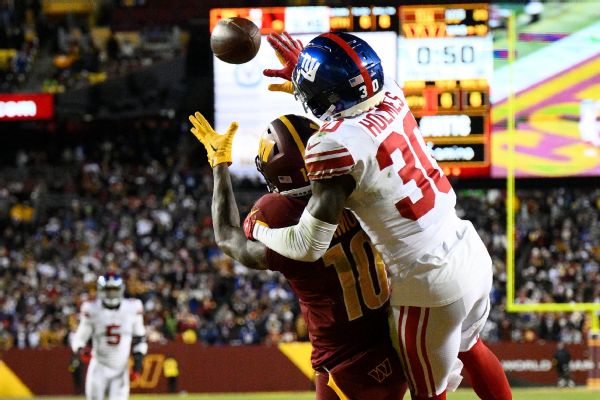Commanders dispute costly penalties, missed PI
A game with major playoff implications ended in controversy Sunday night as the Commanders disputed one penalty that wiped out a…


LANDOVER, Md. — A game with major playoff implications ended in controversy as the Washington Commanders disputed one penalty that wiped out a touchdown and argued for a pass interference call on a fourth-down throw into the end zone in the final minute of a 20-12 loss to the New York Giants on Sunday night.
The Giants (8-5-1) hold a commanding lead for the sixth playoff spot, while Washington (7-6-1) remains in the seventh and final spot but now faces a tougher road to clinch a berth with only a half-game lead over the Seattle Seahawks and Detroit Lions.
The Commanders were upset with an illegal formation penalty on wide receiver Terry McLaurin that nullified a 1-yard Brian Robinson touchdown run with 1:03 remaining.
Two plays later, Washington said wideout Curtis Samuel was interfered with on a fourth-down throw in the end zone. No call was made.
“Don’t ask me about the refereeing,” Washington coach Ron Rivera said in his postgame news conference. “I can’t answer the question.”
Washington also was upset with an offensive pass interference penalty that wiped out a 2-point conversion in the third quarter. But the final sequence stood out because Washington was out of chances.
McLaurin was upset because he said he didn’t line up differently than he had at other times in the game.
On the replay, the official on that side motioned to McLaurin that he should move up. McLaurin scooted up.
“When I moved up, I checked to see if I was good, and he said I was good,” McLaurin said. “I’m not trying to get fined. We had other opportunities; for it to come down like that is tough.”
McLaurin could be seen giving a thumbs-up sign to the official. He said he heard the official say he was OK. But he also said he can’t leave it up to the officials.
“It’s frustrating because I pride myself on paying attention to detail,” McLaurin said. “With the game on the line, you don’t want to make a mistake to hurt your team. I wanted to make sure I was good, and I felt I was with his confirmation. I take ownership, and I have to make sure it’s not close, but it’s kind of tough. Sometimes your helmet is leaning over, and they may call offsides.”
Referee John Hussey said he did not see any exchange between McLaurin and the official before the snap.
“What I was told and what has been confirmed is that the ball was snapped at the half-yard line, and he was lined up a yard back at the 1½-yard line,” Hussey told a pool reporter. “In order to be deemed legal, he needs to break the beltline, the waist of the center, and he was not breaking the waistline of the center. That’s why the penalty was called, because he was not in a legal formation.”
Two plays later, on fourth-and-goal from the 6-yard line, quarterback Taylor Heinicke scrambled around then lofted a pass to Samuel in the middle of the end zone. Corner Darnay Holmes was behind Samuel.
Heinicke said, “Oh yeah,” when asked if he thought pass interference should have been called.
“The dude has his arm around his neck,” Heinicke said, adding that the Commanders can’t blame officials for the loss.
“I can’t control that,” Samuel added. “All I can do is try to make the play when the ball is in the air. I’m not a ref; ain’t nothing I can do about that.”
As Hussey explained it, “Pass interference is a judgment call. To the officials, it didn’t rise to what they felt was a restriction, thus they didn’t call it.”
The Giants had a different perspective on what essentially amounted to the game-ending play. It allowed them to escape the crucial contest with a win and put their odds on making the postseason at 90%.
“It was a good play,” Giants coach Brian Daboll said calmly. “A good play.”
Holmes was noncommittal on if it was interference. He had already been called for a holding earlier in the game, and he leads the Giants after having been flagged eight times already this season.
“I didn’t even watch the play yet. I just know the ball was broken up. We shall see once I watch film but, hey, the refs have eyes,” Holmes said. “They are going to call what they are going to call. We just live with their call. There are some plays I wish they didn’t call, and there are some plays I knew I did something, and they call it.
“End of the day, refs make the calls, and we rock with it.”





